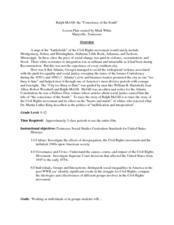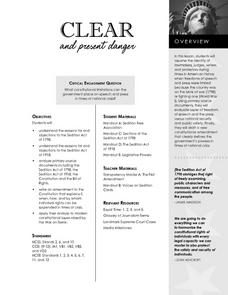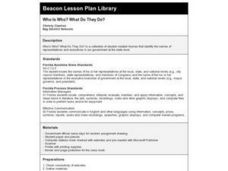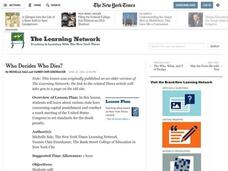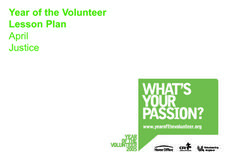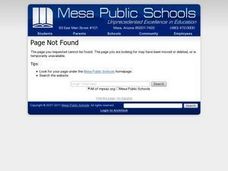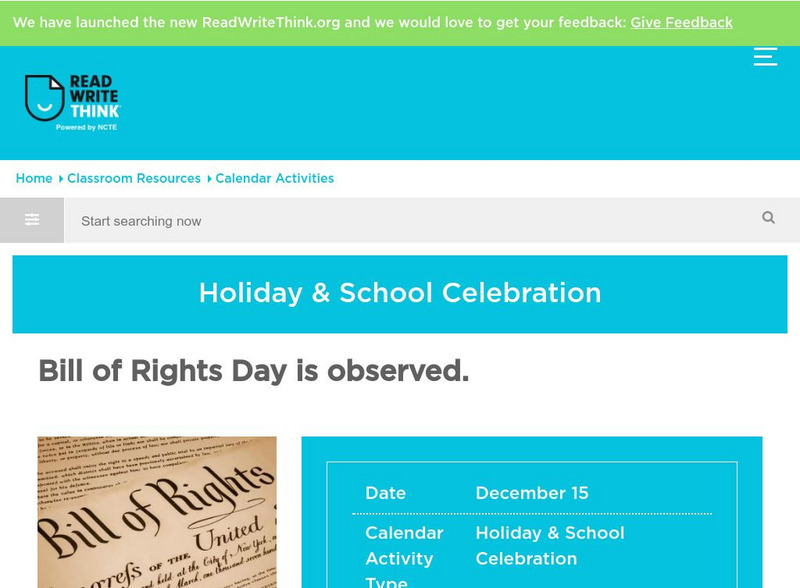Curated OER
Black Americans in Delaware from 1639 to the Present: An Overview
Students complete matching activities and write an essay about Black Americans in Delaware from 1639.
Curated OER
Ralph McGill: the "Conscience of the South"
Students view a film, "Dawn's Early Light: Ralph McGill and the Segregated South." As groups of students observe the movie, they list key dates, significant persons interviewed, and cultural characteristics. Upon completion of the movie,...
Curated OER
Clear and Present Danger
Students assume identities of lawmakers, judges, writers, and protestors during times in American history when freedoms of speech and press were limited because country was on the brink of war or fighting one. Students use primary source...
Curated OER
Constitutional Issues: The Separation of Powers
Students research and stage a debate on the question: RESOLVED that the Constitution should be amended to provide for a parliamentary system of government. They debate if a parliamentary system of government might be better.
Curated OER
Who Is Who? What Do They Do?
Second graders create rhymes in order to remember the names of representatives and executives in our government at the state level.
Curated OER
Interpreting the Law on Safe Employment
Students watch a video and examine the United States government and the process of appeals.
Curated OER
Search and Seizure
Learners participate in a simulation that involves a search and seizure activity. The rights of students in the school setting is investigated. An examination of the Fourth and Fourteenth Amendments of the United States Constitution is...
Curated OER
Individual Rights -- Freedom of Speech at School
High schoolers examine their individual rights at a public school. In groups, they identify the most common ways of expressing themselves and why they should limit their speech in public. They compare and contrast two cases in which they...
Curated OER
Keeping an Appointment
Students studey about Bernard B. Kerik's decision to withdraw his nomination as homeland security secretary by President Bush. They hold a mock vetting process for other potential nominees for this position.
Curated OER
Who Decides Who Dies?
Students explore various state laws concerning capital punishment and conduct a mock meeting of the United States Congress to set standards for the death penalty.
Curated OER
Should the United States Have a Central Bank?
Students assess the validity of a national bank. They study the importance of McCullough v. Maryland. They review the arguments of Hamilton and Jefferson. They analyze the Tenth Amendment and the debate over state v. federal power. They ...
Curated OER
Issues in Public Education During the Kentucky Civil Rights Era
Students conduct oral history interviews and research historical and contemporary media articles about multiculturalism and diversity.
Curated OER
Justice
Students consider the role of justice in the formation of the United States and in the operation of today's criminal justice system. They investigate symbols associated with justice and references to justice in the Constitution.
Curated OER
Voting and the U.S. Constitution (Past, Present, and Future), Part 2
Students analyze and discuss the 19th Amendment, and read the document, Why Women Want to Vote. Students illustrate statements from the handbill, then conduct a play about women's suffrage.
Curated OER
Democratic Process, Constitutional Issues, Local Government
Twelfth graders engage in the decision making process so as to encourage them to become active citizens upon graduation from high school.
Curated OER
Discovering Unusual Facts about U.S. Presidents
Students research information on the Internet about past presidents. They verify answers using an encyclopedia and generate a report regarding the accuracy of electronic information sources.
ReadWriteThink
Read Write Think: Bill of Rights Day Is Observed
Contains plans for seven lessons that ask students to examine Supreme Court cases that have impacted civil liberties in the United States. Students work in groups and report their findings using PowerPoint presentations. In addition to...
iCivics
I Civics: Mini Lesson: Judicial Activism & Restraint
Lesson teaches the judicial philosophies of activism and restraint and also explores criteria through which students can evaluate news-related opinion pieces and practice judging the value of a Supreme Court-related opinion piece of choice.
Constitutional Rights Foundation
Constitutional Rights Foundation: Mc Culloch v. Maryland (1819): John Marshall and the Bank Case [Pdf]
Lesson on Supreme Court Landmark case in which students analyze the constitutional argument and significance of McCulloch v. Maryland and further analyze and interpret implied constitutional powers of Congress through writing, discussion...



